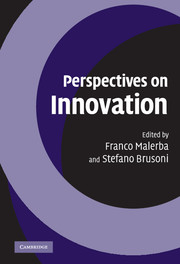Book contents
- Frontmatter
- Contents
- List of figures
- List of tables
- List of contributors
- Prefatory note
- Introduction
- Part 1 Innovation and economic growth
- Part 2 The microdynamics of the innovation process
- Part 3 Innovation and industrial dynamics
- Part 4 Innovation and institutions
- Part 5 Innovation, firms' organization, and business strategies
- 9 Bringing selection back into our evolutionary theories of innovation
- 10 From leadership to management: mobilizing knowledge for innovation in strategic alliances
- Comments to Chapters 9 and 10
- Part 6 Innovation and entrepreneurship
- Part 7 Innovation and evolution of the university system
- Part 8 Innovations and public policy
- Index
10 - From leadership to management: mobilizing knowledge for innovation in strategic alliances
Published online by Cambridge University Press: 06 January 2010
- Frontmatter
- Contents
- List of figures
- List of tables
- List of contributors
- Prefatory note
- Introduction
- Part 1 Innovation and economic growth
- Part 2 The microdynamics of the innovation process
- Part 3 Innovation and industrial dynamics
- Part 4 Innovation and institutions
- Part 5 Innovation, firms' organization, and business strategies
- 9 Bringing selection back into our evolutionary theories of innovation
- 10 From leadership to management: mobilizing knowledge for innovation in strategic alliances
- Comments to Chapters 9 and 10
- Part 6 Innovation and entrepreneurship
- Part 7 Innovation and evolution of the university system
- Part 8 Innovations and public policy
- Index
Summary
Introduction
Barriers to co-innovation between firms often arise from the contradiction between the uncertainty, ambiguity, and unforeseeable sharing of risks and benefits that characterize co-innovation and the need to specify the exchange between the parties, and be able to write a complete contract. Opportunities for significant value creation that would require co-innovation may thus go unexploited.
This chapter addresses these issues from a Schumpeterian innovation perspective, by showing how two firms – Hewlett Packard (HP) and STMicroelectronics (ST) – developed an innovative approach toward convergent interests and relational contracting in the development and manufacture of inkjet printer cartridges.
In addition to the central problem of uncertainty and ambiguity, these two firms also faced the problem of bringing together new knowledge from a plurality of locations, and therefore, across geographic, organizational, and contextual boundaries.
In particular, their innovation thus had to overcome at least four different barriers to knowledge integration:
Knowledge diversity: knowledge from multiple domains has to be assembled, melded, and integrated. Different domains (such as technical disciplines, industries, or professional practice areas) have different rules and heuristics for creating, expressing, and sharing knowledge, and these are not always easy to reconcile.
[…]
- Type
- Chapter
- Information
- Perspectives on Innovation , pp. 308 - 321Publisher: Cambridge University PressPrint publication year: 2007



